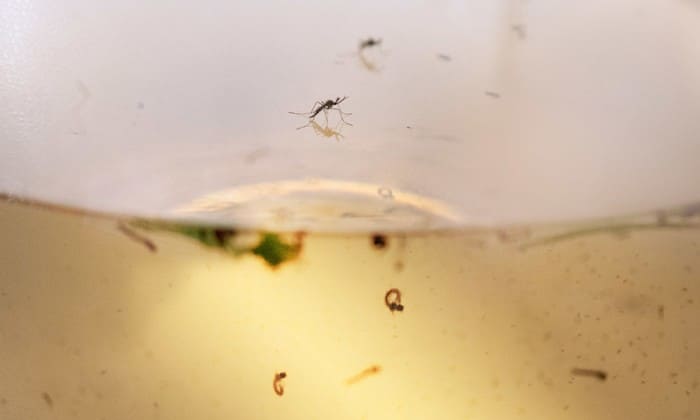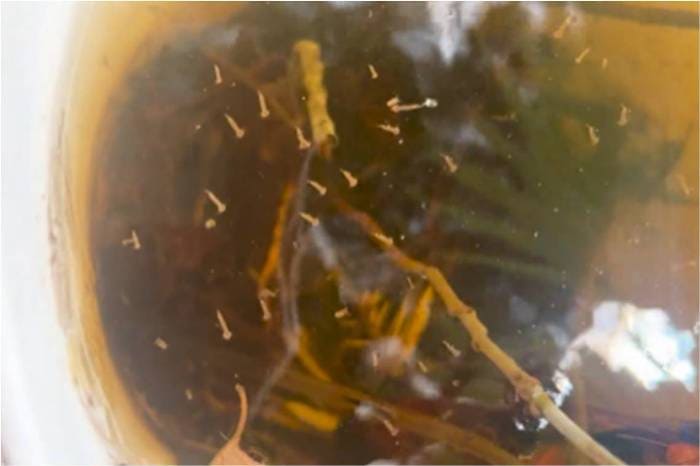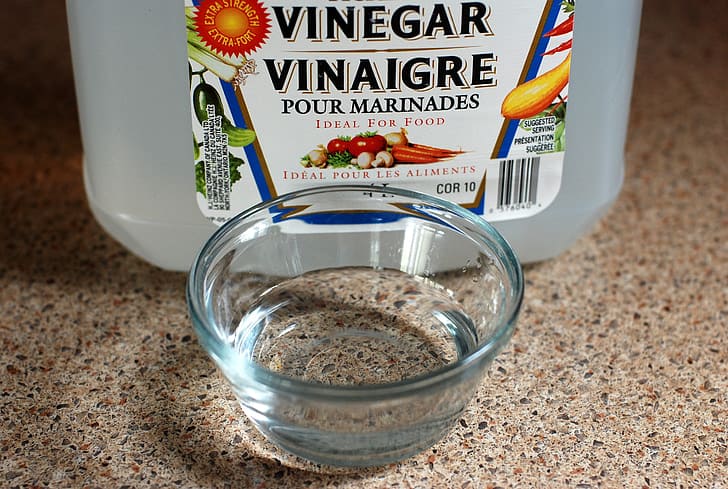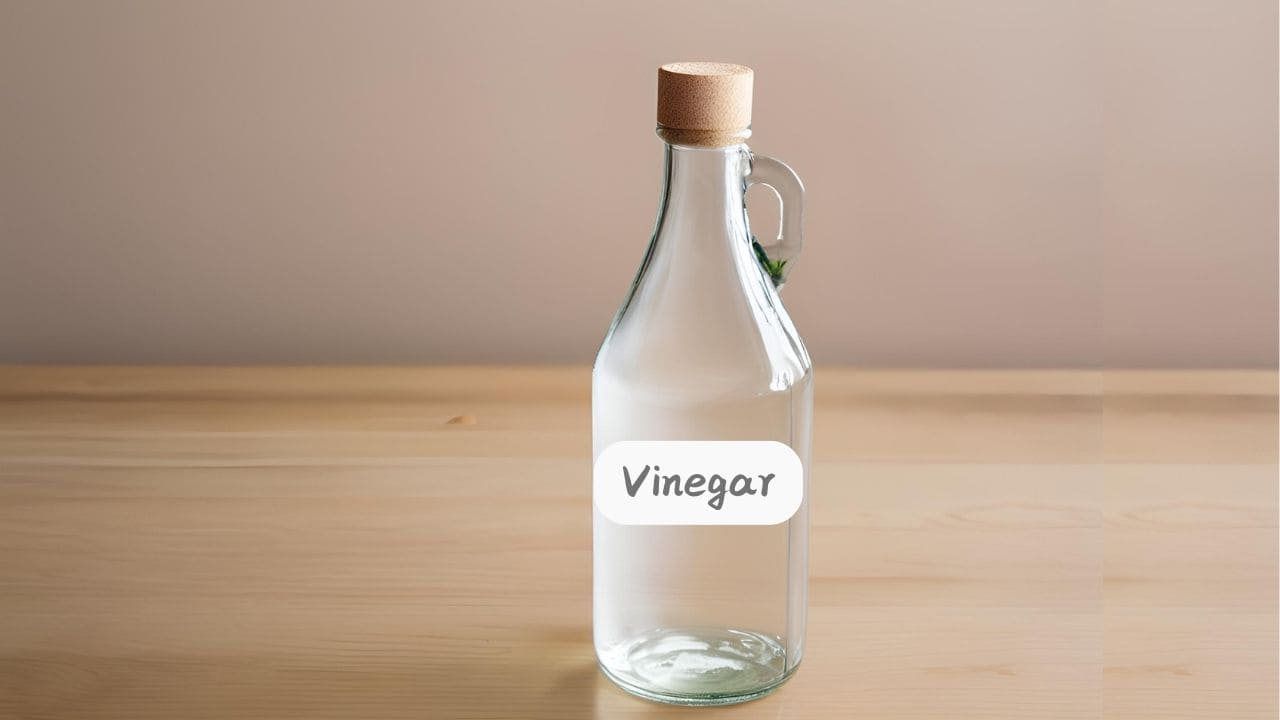Table of Contents
Importance of controlling mosquito larvae population
Avoiding all the major problems associated with mosquitoes may be its, mosquito bites, disturbances in sleep, health risks, transmission of diseases, etc. requires control over the mosquitoes population at source. Only by destroying the eggs or killing the mosquito larvae, we can have control over their population.
We must effectively target these mosquitoes at the larval stage, to reduce the health risks and transmission of diseases. Mosquito larvae which hatches from eggs are more easier to eliminate from standing sources of water like pond, fountain, tanks, barrels, etc. as compared to adult mosquitoes.
Since, most of the water sources can be inside house or garage, like water tanks, barrels, plant pots, containers, toilet bowls, leaking faucets, etc. So, in order to kill mosquitoes larvae within house we must opt for some natural larvicides. This is where the role of vinegar comes into play.

Image Credit: Flickr, NIAID | Creative Commons License
How vinegar kill mosquito larvae
Particularly white vinegar is the useful effective solution for killing mosquito larvae. The active ingredient in white vinegar is acetic acid, which is responsible for killing mosquito larvae in water.
Apple cider vinegar has also been reported to give some effective results, but not as good as white vinegar. If you are using Apple cider vinegar, you need to add sufficient vinegar to the water body to make up at least 15% solution in water body.
Vinegar kill mosquito larvae by lowering the pH of water to acidic and creates an environment that is not suitable for growth of larvae. The acidic pH of water is inhospitable to mosquito larvae which leads to their end. As the mosquito larvae are unable to adapt and survive to the highly acidic environment, the vinegar plays and natural and effective role in killing mosquito larvae.
The acidic environment created by vinegar disrupts the ability of larvae to maintain the homeostasis, as they are meant to grow and survive in specific water conditions. Furthermore, the acetic acid enters the outer layer of mosquito larvae and cause cellular damage which leads ultimately to their death. This highly low acidity levels disrupts their ability to survive by affecting their osmoregulation and overall physiology.
Also, vinegar forms a layer on the surface of water that leads to suffocation, by restricting their access to oxygen.
Effectiveness of vinegar in killing mosquito larvae
The effectiveness of vinegar is driven by many factors like:
- concentration of vinegar used
- species of mosquito larvae
- volume of water
- environmental conditions
Though using higher concentration of vinegar will do the job perfectly, but around 15 to 20% of vinegar solution can be sufficient to kill mosquito larvae. Vinegar can be used effectively to kill most of the mosquito larvae in first few hours of application. But its effectiveness also depends on the type and species of mosquito and conditions of water where they are found.
Vinegar can be most effectively used in small and contained bodies of water like bird baths, water tanks, puddles, small decorative pond, barrels, etc. where the concentration of vinegar can be easily controlled and maintained, without any danger.
Does white vinegar kill mosquito larvae
White vinegar is the only particular vinegar type that is used effectively for killing mosquito larvae. The concentration of acetic acid in white vinegar is around 4 to 7% which is sufficient enough to create acidic environment that is unfit to live in.
As compared to other vinegars like apple cider vinegar, or balsamic vinegar, the white vinegar is more widely and easily available and is less expensive. And so, it can be affordably used for mosquito control.
White vinegar and mosquitoes
White vinegar is most widely used natural remedy for getting rid of mosquito larvae. It is an eco friendly, non-toxic and safest method to reduce mosquito population at source. Most effective for small water sources like bird baths, flower pots and vases, uncovered containers, etc.
Beyond its larvicidal properties, white vinegar can also be sued as a mild mosquito repellent. White vinegar sprays can create acidic smell and environment that is unattractive for mosquitoes. Although its effectiveness as mosquito repellent is not that convincing, so it is recommended to target mosquitoes at early stages with white vinegar, which gives much better control over reducing their population at source.
How to use vinegar to kill mosquito larvae
Using vinegar to kill mosquito larvae is very simple and can be done in few steps. Use vinegar in mosquito breeding sites as per the step-by-step guide given below:
Step #1: Identify Breeding sites
Check all the areas in vicinity and surroundings where stagnant water can accumulate or pool to form puddles. Also, look for uncovered containers, water tanks and barrels which are highly prone and attractive sites for mosquito breeding. Mosquitoes are attracted to such conditions where there is water, warm and humid environment with darkness, which remains undisturbed. They start breeding by laying eggs in water bodies, which then hatches into mosquito larvae.
Check for following common breeding sites for mosquitoes:
- puddles in driveway
- bird baths
- marshy land
- ponds and fountains
- swimming pool
- water tanks/septic tanks
- uncovered containers
- water barrels
- clogged drainage systems
- jam gutters
- buckets, tires, pool covers,
- water pooling due to leakages
- houseplants, flower vases and plant pots for excess water
- unused toilets and toilet bowls

Image Credit: MosquiTalk.com
Step #2: Prepare the vinegar solution
Prepare the vinegar solution approximately 20 to 25% in concentration. This can be made by mixing 1 part of vinegar to 3 parts of water. Please be noted, this concentration is just to dilute the vinegar. The actual concentration that requires to maintain and create the required acidic environment that is lethal for mosquito larvae, depends on the volume of the water at the breeding site.
For larger volumes like ponds, fountains, pools, you have to increase the concentration enough to get the required acidic environment, around 3 to 4 pH. This highly acidic pH is not possible and practical to achieve to get in larger volumes specially where there are other aquatic animals in water.
For larger water bodies, alternative options like BTI (Bacillus Thuringiensis Israelensis) and other larvicides will be more practical and safe.

Image Credit: Google Images | Creative Commons License
Step #3: Apply the vinegar solution
Add the vinegar solution into the stagnant water body, make sure to distribute the vinegar evenly throughout the surface of the water. Proper addition of vinegar all over the surface will improve its effectiveness against the larvae. Since, the acetic acid in vinegar is volatile and evaporates quickly from the surface, you may need to add again to get rid of the larvae completely.
Step #4: Monitor for any sign of larvae
After addition of vinegar solution give some time for action. The larvae gets completely exposed and in few hours the vinegar will effectively kill all the mosquito larvae. Check for any signs of larvae still remaining unaffected. If found, reapply vinegar solution in those corners and portions to get it done completely.
Step #5: Reapply
Frequent checking and inspection of water bodies is required specially after rains when new stagnant water bodies are formed. Reapply as needed to keep mosquito populations at bare minimum.
Alternative natural methods for controlling mosquito larvae
There are alternative methods that can also be used instead of vinegar or with vinegar to control mosquito larvae, some of which are given below:
- Bacillus Thuringiensis Israelensis (BTI): It is naturally occurring bacterium that specifically targets and kills mosquito larvae without affecting humans, animals, pets and other aquatic life.
- Essential oils: Certain essential oils like eucalyptus, citronella etc. have larvicidal properties and can be used in a similar manner as vinegar to treat standing waters.
- Fish: There are certain mosquito larvae eating fish that can be added to ponds and other water bodies to reduce the larvae population. Fish like goldfish or guppies are commonly used for this purpose.
- Mosquito Dunks: These are donut shaped devices that slowly release insecticides, or other larvicides like BTI inside water bodies, which slowly and gradually kills larvae over time.
We can also do frequent cleaning and removal of standing water either by emptying or circulating water or any kind of agitation inside water, where we can prevent mosquitoes for laying eggs in the first place. This will be most practical way to cut down mosquito population by preventing mosquitoes for laying of eggs, if it is a small water source. This is how the very first stage of mosquito breeding can be avoided.
Conclusion
It is very important to control mosquito larvae population to prevent transmission of many mosquito borne diseases. White vinegar has been found to be effective in killing mosquito larvae in small bodies of water. Since, it is easily available and affordable it is most preferred natural larvicide.
In highly infested areas like large ponds, where adding higher quantities of vinegar or maintaining the highly acidic environment is not practical and so other alternative ways like fish, BTI, mosquito dunks are used, which specifically target larvae without affecting any aquatic life
Whatever methods and forms of vinegar or any alternative larvicide that we are going to use, it should be able to control mosquito population at source. Once the larvae develops into mature and adult mosquito, it becomes difficult to find and kill them in open sky.
Frequently Asked Questions (FAQs)
-
Can you kill mosquito larvae with vinegar?
Yes, white vinegar is used for the purpose. It is most effective natural larvicide that kills mosquito larvae in standing water sources.
-
Will vinegar kill mosquitoes in water?
Yes, particularly white vinegar is used to kill mosquitoes at larval stage. Just add vinegar diluted solution in water to create an acidic environment where the larvae can’t survive. Within couple of hours, white vinegar can effectively kill mosquito larvae.
-
Will vinegar kill mosquito larvae?
Yes, sufficient quantity of vinegar solution is required to create acidic environment that will kill mosquito larvae. For larger water bodies like pond or fountain it is advised to use other effective larvicides like BTI, Mosquito dunks, fish etc.
-
Does vinegar kill mosquitoes in standing water?
White vinegar is very effective in killing mosquito larvae in standing water. It kills mosquito larvae only and not adult mosquitoes. It has got some mild mosquito repelling action but that is not reliable when it is used alone.

